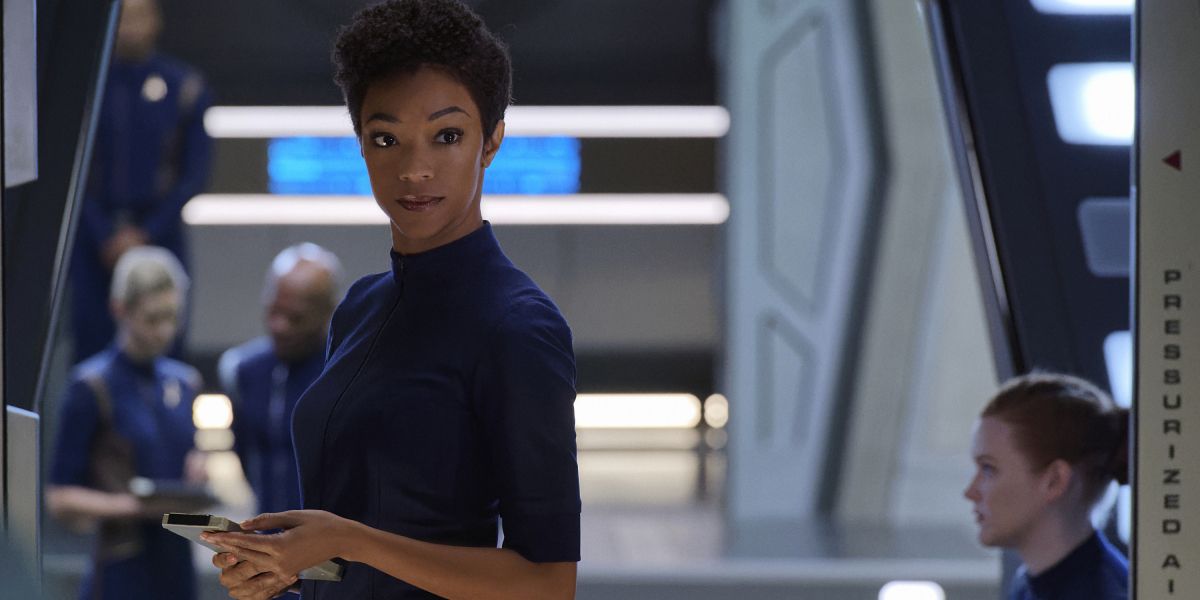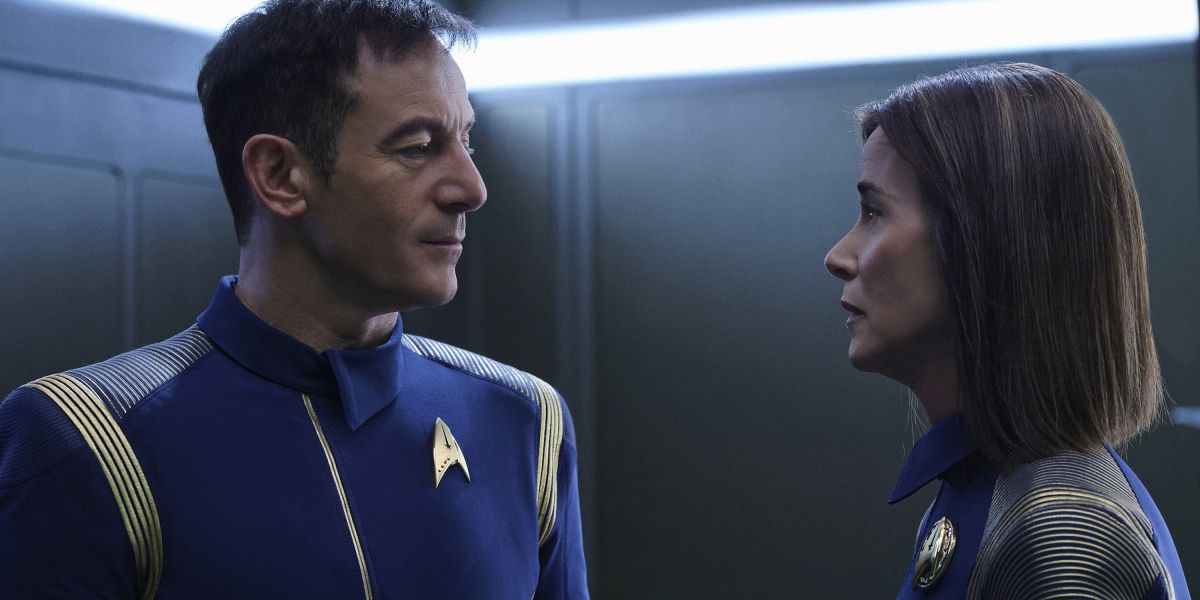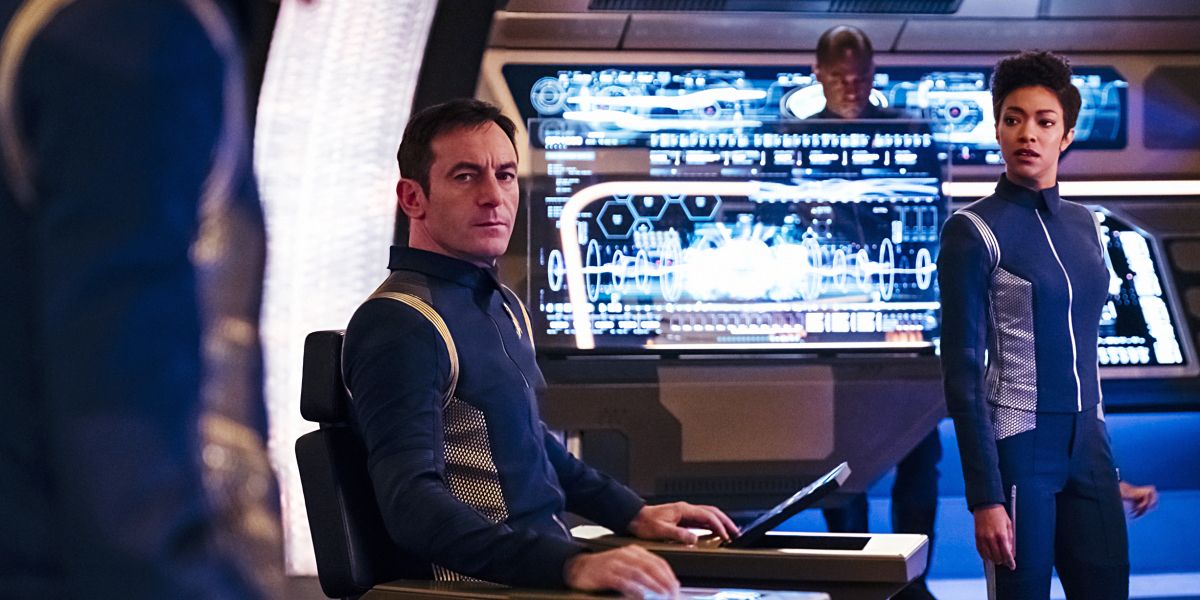Star Trek: Discovery goes well past a mere name drop with Spock, by delving into just how the character helped shape Michael Burnham's future.
Although he's nowhere to be seen in 'Lethe', Star Trek: Discovery nonetheless makes Spock into a major player during an hour that capably demonstrates the ways in which the series continues to excel, while also further underlining the places that could still use some work. Like so many of its characters, Discovery is still figuring itself out. That means coming to terms with where and how it fits in the Star Trek universe, and just how well it's going to be able to play with established Trek canon and lore, especially since the new series has been positioned in such close proximity to The Original Series. While a sense of uncertainty helps make Michael, Captain Lorca, Stamets, and, more recently, Lt. Ash Tyler more interesting, it does raise some concerns as to how quickly the show needs to establish its place in the larger Trek franchise. Which makes it all the more interesting when the sixth episode of the first season doesn't just drop what is one of two names you immediately think of when you hear "Star Trek", but actively engages the audience with a meaty example of just how the celebrated Vulcan plays into Michael Burnham's past.
The show hasn't been above dropping names before now, and as the episode's cold open proved, it certainly didn't shy away from having Michael make direct reference to the USS Enterprise. That's in keeping with past references the series has made to TOS, such as putting the late Captain Georgiou in the same category as Captain Pike, but this time, due in large part to the role Sarek has already played, Discovery was put in the position of having to double down on the origins of its main character and her somewhat divisive familial (though not biological) connection to Spock and his ever so logical pops. And when it came time to deliver on how Spock and Michael were connected, in a way that went beyond a shared connection to Sarek, Discovery delivered with a revelation of how Sarek’s ambitions for human/Vulcan relations set a peculiar, unintentional course for his two children that, given what we know about Michael’s motivations in the Battle at the Binary Stars, presents a huge “what if” that humanizes the seemingly emotionally distant Vulcan in a way that’s unexpected.
Related: Star Trek: Discovery Viewers Experience Problems With CBS All Access
You might call the situation Sarek’s Choice, in that, as ‘Lethe’ reveals, he’s asked to determine the fates of his two children to a large extent. The choice stems from their biology — Michael is human and Spock is half human — which makes allowing them entry into Vulcan Expeditionary Group something of a new frontier for the alien race, one that, as demonstrated by terrorist attack on Sarek’s ship by a “logic extremist,” suggests that, like the Klingons, the Vulcans have more than their fair share of individuals concerned with the idea of racial purity. As such, upon learning that he succeeded in making an eminently logical being out of his adoptive daughter, Sarek’s good (and maybe secretly haughty) intentions don’t go unpunished, as his affinity for humans comes back to bite him when he’s told only Michael or Spock will be allowed in the Vulcan Expeditionary Group, and he choses his biological son over the woman who has none of the genetic advantages Spock does. Children being what they are, Spock would later go on to choose an appointment to Starfleet over the one his father chose for him.
As much as Discovery has used Sarek as something of a placeholder for Spock, the revelation here works to the advantage of Michael’s (and the show’s) relationship with both men — even though it’s likely one will never see the light of day on this series — while also stimulating the audience’s interest in the relationship that’s actually available to those watching. It’s to the show’s credit it not only established that something about Michael’s past was being hidden from her, but that she was actually able to discover what that was during the hour. Say what you will about Michael and Sarek’s Katra bond, but the convenience of the narrative device has so far paid off for Discovery — especially when it comes to the way it was used here. Secrets can only drive a narrative for so long, and Discovery smartly put this secret out in the open during an hour when James Frain’s role as Sarek would benefit the most from the revelation of his shortcomings both as a father — using your kids to further your cause of integrating humans and Vulcans may be logical, but it’s also a little… well cold — and as a Vulcan Ambassador. Putting Michael into Sarek’s headspace and forcing him to confront the mistakes of the past goes a long way in making the parent/child relationship seem much more human and familiar than before. It’s a unexpected payoff that is bolstered by the mention of Spock that further justifies the series’ off-screen use of the character.
In an episode that was as interested in how the past is and isn’t forgotten, and how it can drive people to make decisions they may not even fully comprehend, ‘Lethe’ managed to show how badly Star Trek: Discovery wants to make use of TOS and its characters, but it also showed that it knows how to do more than merely drop a name like Spock. If anything, what the show offered here makes the prospect of a more expansive and involved relationship between Michael and Sarek seem like something very appealing indeed. And if the writers want to throw more mention of Spock in there, too, well, they’ve earned it.
Other Thoughts:
Captain Lorca continues to be an interesting character and a fascinatingly atypical example of a captain on Star Trek. His relationship with Admiral Cornwell was a surprise, but his pulling a gun on her in the middle of the night certainly surpassed even that. What exactly is going on with the captain remains to be seen, but it does pose an interesting potential wrinkle with regard to the fan theory that’s floating around out there about Ash Tyler and whether or not he’s what he seems.
Speaking of Ash, the behavior of the newest member of Discovery’s crew (unless you count Michael’s recent official appointment at the end of the hour) seems to contradict the fan theory so far, with the good captain’s recent behavior serving as either a zig where Discovery was thought to have zagged, or he’s just really good at what he does. Either way, Ash has made for a welcome addition to the crew.
Stamets and Tilly continue to grow into more likable, rounded characters. While it’s clear Stamets and adventures in unauthorized eugenics — which may have resulted in his mysterious mirror image problem — is likely to blame for his sudden personality shift and use of the word “groovy”, Tilly has come into her own at a much more gradual pace. The result is two fun scenes with both characters interacting with Michael in ways that don’t feel as forced as they did just a few episodes ago.
Next: Star Trek: Discovery’s F-Bombs Are Not a Big Deal
Star Trek: Discovery continues next Sunday with ‘Magic to Make the Sanest Man Go Mad’ @8:30pm on CBS All Access.



